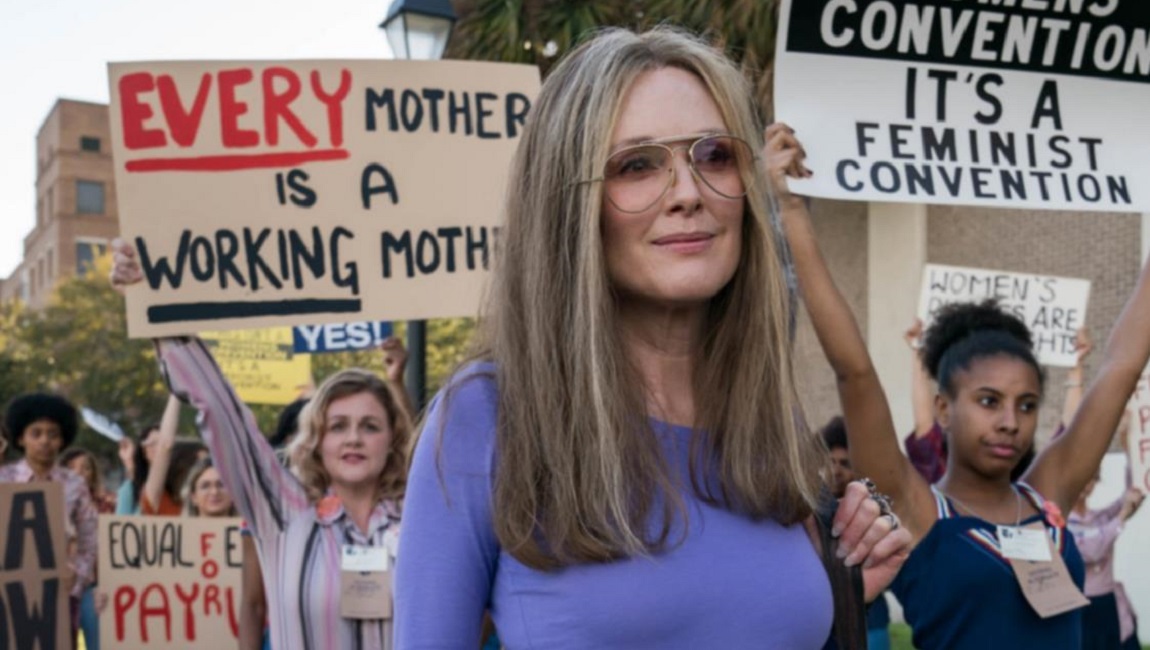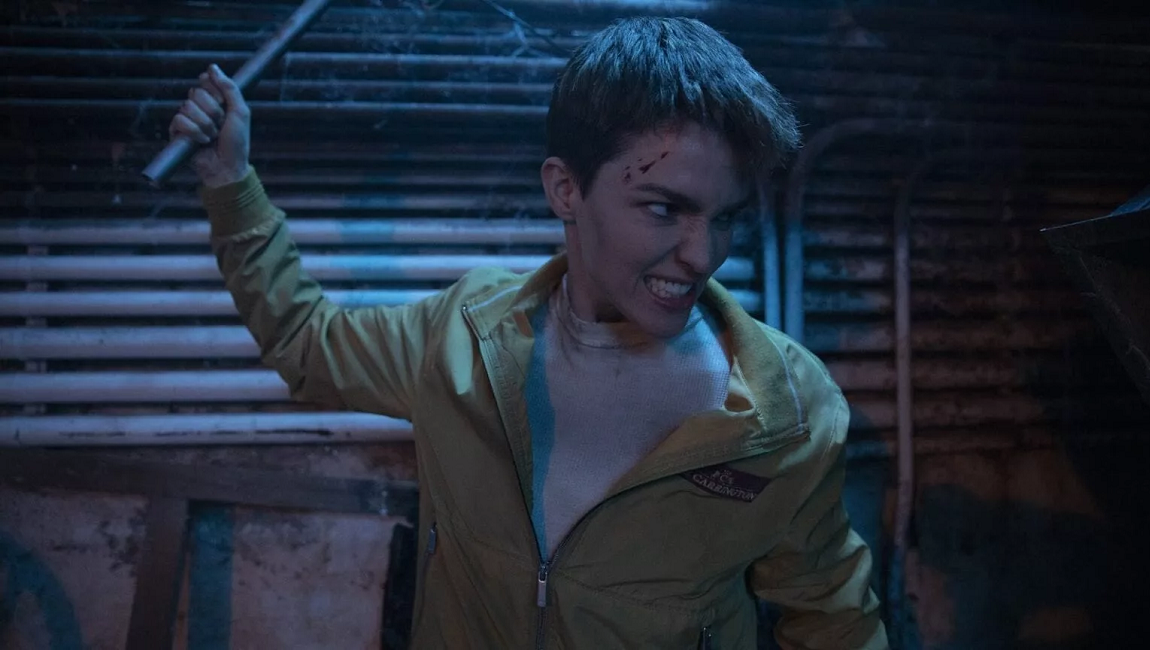The single worst thing that ever happened to Michael Moore — as artist, as thinker, as gleefully sardonic agitator — was becoming incredibly rich and famous. Never mind that the man’s high profile has now made it next to impossible for him to dupe any right wing sacrificial lambs into stooping before his lens. (Ambushing Charlton Heston was, it would seem, a once-in-a-lifetime cheap shot.) It’s a sick, sad joke that the biggest name in documentary film has always prided himself on not getting interviews. No, for Moore, the central drawback of celebrity has been the compromise of his credibility. Think about it: how do you preserve your reputation as an underdog rabble-rouser when you’ve got both an Oscar (2002’s Bowling For Columbine) and the highest-grossing doc of all time (2004’s Fahrenheit 9/11) under your belt? You don’t have to be one of the little guys to stand up for them — Springsteen never really worked in a factory — but it’s pretty hard to rage against the machine when you’re a valuable component of it. Is this what Thomas Frank meant when he wrote of “commodifying dissent?”
Though Moore remains one of the most influential filmmakers of the decade, he’s become something of a pop-culture punch line, reviled on both ends of the socio-political spectrum. To The Right, he’s Public Enemy #1 — that might earn him some Blue State cool points, but good luck converting any Red State nonbelievers. To the Left, he’s a liability, the kind of obnoxious loudmouth that liberals decry for giving their cause a bad name. So repellant do many folks find Moore’s plus-size personality that they often wholesale dismiss the big and bold ideas he’s pushing with it, which is a bit like throwing the baby out with the bathwater. Course, the blame belongs rather squarely with the auteur: by putting himself front and center, by tangling his own ego into the issues, by awkwardly inserting his grating onscreen persona into each and every new picture, Moore has made sure that his messages live or die with how well folks stomach him. It’s not the wisest approach for such an insufferable blowhard, though a parade of pop-doc imitators — each adopting their own distinct distillation of the filmmaker’s jokey, confrontational Infotainment — would seemingly beg to differ. Success may have irreparably clouded his artistic judgment, but Moore still has one finger pressed firmly on the pulse of his enraged, uneasy demographic. His specialty has always been heat seeking a hot button issue and hustling out his own bombastic treatise on it. (It’s a shrewd strategy, in terms of maintaining both commercial viability and cultural relevance.)
Having previously mined the Columbine massacre, the aftermath of 9/11, and health care reform for vitriolic tragicomedy, Moore now sets his opportunistic sights on the American economic crisis, and on the fat cats that both fueled and profited from its arrival. It makes perfect sense that he would tackle this subject now, and not just because of its inherent topicality: every one of the filmmaker’s previous polemics, from 1989’s Roger and Me to 2007’s Sicko, have pinpointed corporate greed as the root of a larger social problem. But while this latest effort represents a logical progression in intent, a kind of culmination of the director’s thematic concerns, its techniques and methodologies are completely regressive. A “love story” only in the most cheaply, bitterly ironic of ways, Capitalism might have adopted a more fitting subtitle: Moore of the Same. The Big Guy hasn’t been this worked up in years, but anger doesn’t suit Moore like it does some of his lower-profile, agitprop contemporaries (i.e. Robert Greenwald or Alex Gibney). He’s better when he’s being empathetic — I’ve never doubted the man’s convictions, just his broad gestures and hack-comic tactics. Moore unwisely frontloads Capitalism with the bleeding heart stuff — the real-life testimonials, usually the most poignant and persuasive material in his repertoire — before moving on to his weathered old tricks, forever playing the pandering P.T. Barnum of the political doc circuit. There’s the soothing voice-over narration, perched precariously between cheese-dick sentimentalism and condescending sarcasm. There are the found footage collages, reduced this time around to little more than juvenile vaudeville routines. (For ridiculous example, Jesus of Nazareth is re-cut to depict The Messiah denying miracle “coverage” to his penniless supplicants.) And of course, as always, there are the stunts, the director’s tired man-on-the-street pranks. Here we get Mike storming the lobbies of the Big Banks, tongue in cheek and big, cartoon money bags in hand. This is the state of “smart” political discourse, circa 2009: Jaywalking for dimestore dissidents.
Yet when he benches the shtick and gets down to the brass-tack business of honest journalism, Moore’s outrage can be infectious. One of the filmmaker’s greatest (and least heralded) gifts is his ability to condense historical information into manageable blasts of pointed montage. “There ain’t no middle no more,” one evicted tenant impotently mutters, a pile of his material possessions burning loudly in a heap near by. Taking this sentiment as something of a mission statement, Moore methodically maps out the growing schism between the haves and the have nots, tracing its roots back to World War II and, later on, to the inauguration of one-time corporate shill Ronald Reagan to the office of U.S. President. Taking clear shape is a damning indictment of big business greed, one compounded by the filmmaker’s uncanny ease in procuring sensitive documents and incriminating video footage. (Another Moore specialty — remember Bush’s eight minutes of paralyzed uncertainty in Fahrenheit 9/11?) The best moments in Capitalism are these bits of snark-free muckraking: a stockholders memo that openly rhapsodizes about the American “plutocracy”; the “Dead Peasants” clause, which allows billion dollar companies to take out secret life-insurance policies on their employees; and incredible footage of former Merill Lynch CEO Donald Regan, who essentially bought a spot on Reagan’s cabinet, whispering for the new president to “hurry it up” during a speech.
By the time he gets around to this spring’s big bank bailout, a “backdoor” congressional re-vote pushed through against the express wishes of the American people, Moore’s righteous indignation has skyrocketed to record highs. It’s then that the firebrand filmmaker unveils his rather radical central agenda: the complete abolition of capitalism itself. It’s admittedly kind of innervating to see a mainstream mainstay like Moore openly call for the dismantling of our entire economic system. (How’s that for commodified dissent?) Yet as controversial stances go, this one’s both incredibly dubious in likelihood and very thinly argued. Moore points to abuses of the system as evidence of its essential failure, ignoring those Western democracies that closely monitor their free market economy and offer assistance to the needy. He takes great care to demonstrate that capitalism is never mentioned in the Constitution, as if all its proponents were merely supporting the system because they assumed, you know, that it’s un-American to not do so. And, in a tactic not unlike those regularly employed by FOX News and its ilk, Moore ropes several Christian religious figures into calling capitalism an “evil” that “must be destroyed.” All of this is indicative of the filmmaker’s shady rhetorical devices, his avoidance of the tough questions, his lack of respect for his audience. “I can’t do it alone,” he ominously intones, before calling on each of us to aid him in his pretty futile mission. This could be the least convincing and/or instructional call to arms ever put to tape.
It’s no accident that Capitalism’s release date aligns neatly with the 20-year anniversary of Roger and Me, which dealt, too, with corporate greed — specifically, that of General Motors CEO Roger Smith, whose decision to close an auto plant in Flint, Michigan devastated the city’s economy and left thousands out of work. Moore evokes his first (and still best) feature-length diatribe several times throughout his latest, going so far as splicing in footage of the debut doc. The comparison is not flattering: that Moore, trim and witty and eager to please, still knew the value of moderation, of persuasive eloquence, of carefully rationalizing his oppositional viewpoints. He was a little guy fighting for the little guys, and his moxy won you over. Today’s Moore, spoiled sick by success and entrenched in his bad habits, no longer worries too much about winning anyone over. An increasingly polarizing figure, he preaches loudly to his choir — a choir, I might add, that’s been slowly siphoned away by the sharper and much funnier muckraking of Jon Stewart and his Daily Show. With a new president in office, one who’s made a small effort to reach across party lines and unite wildly disparate philosophies, Moore’s particular brand of one-note cynicism feels downright outdated. The guy’s still shucking and jiving like it’s the summer of 2004 and he still has our ear. He’s still living his big cultural moment, still replaying his headlines-grabbing, multi-million dollar title-fight: Moore vs. Bush, in a theater and voting booth near you. Well, Moore lost that fight. And his M.O. went bad about the same time the last election did.







